Instead of focusing their attention on the country’s crumbling dysfunctional 1.2 million government primary-secondaries, politicians and bureaucrats of the Central and state governments are tying up the nation’s private schools in swirls of red tape even as admission queues lengthen outside their gates Summiya Yasmeen
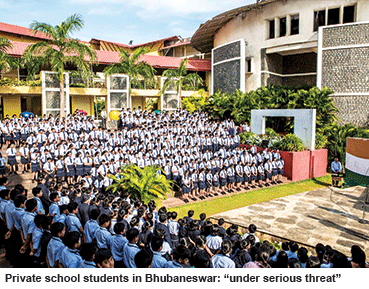 India’s private schools — some of them of centuries’ vintage which have schooled almost the entire 300 million-strong middle class — are under siege. Across the country, private unaided (financially independent) school managements are being targeted by Central and state government education officials for alleged failure to comply with a bewildering plethora of rules and regulations covering tuition fees, admission procedures and government-mandated reserved quotas for children from socio-economically underprivileged households. Instead of focusing their attention on raising rock-bottom teaching-learning standards in the country’s crumbling, dysfunctional 1.20 million government primary-secondaries, aided and abetted by populist politicians, education bureaucrats of the Central and state governments are tying up the nation’s 319,000 private schools in swirls of red tape even as admission queues lengthen outside their gates. Licence-permit-quota raj, which cabined, cribbed and confined Indian industry for over five decades until liberalisation of the economy in 1991, has switched tracks and permeated into education creating chaos, confusion and frustration in the country’s private schools and colleges.
India’s private schools — some of them of centuries’ vintage which have schooled almost the entire 300 million-strong middle class — are under siege. Across the country, private unaided (financially independent) school managements are being targeted by Central and state government education officials for alleged failure to comply with a bewildering plethora of rules and regulations covering tuition fees, admission procedures and government-mandated reserved quotas for children from socio-economically underprivileged households. Instead of focusing their attention on raising rock-bottom teaching-learning standards in the country’s crumbling, dysfunctional 1.20 million government primary-secondaries, aided and abetted by populist politicians, education bureaucrats of the Central and state governments are tying up the nation’s 319,000 private schools in swirls of red tape even as admission queues lengthen outside their gates. Licence-permit-quota raj, which cabined, cribbed and confined Indian industry for over five decades until liberalisation of the economy in 1991, has switched tracks and permeated into education creating chaos, confusion and frustration in the country’s private schools and colleges.
In Punjab, during the past year the state government has reportedly shut down 1,170 ‘budget’ private schools — increasingly preferred by aspirational poor households to dysfunctional government schools — for failure to comply with the infrastructure norms stipulated by the Right of Children to Free and Compulsory Education (aka RTE) Act, 2009. In Tamil Nadu, a state government-appointed Private Schools Fee Determination Committee has mandated way-below-cost tuition fees for 2013-16 for the state’s 6,566 private schools. Similarly, the governments of Maharashtra and Rajasthan have enacted legislation to regulate tuition fees charged by private unaided schools.
The latest attack on independent schools has been launched in the national capital by the populist Aam Aadmi Party (AAP) government of Delhi state. On January 6, it abolished the 20 percent management quota of the city’s 6,600 composite private school managements under which they had the discretion to admit nursery students of their choice. Earlier on December 1, the AAP government piloted two education bills through the Delhi legislative assembly — Delhi School Education (Amendment) Bill and the Delhi School (Verification of Accounts and Refund of Excess Fee) Bill — to proscribe admission screening processes in nurseries and regulate (and refund) “excess fees” levied by private schools in the state. Even though a Delhi high court order of February 16 has restored the 20 percent management quota, private school promoters are wary of the AAP government using the two recently legislated Acts to impose further controls. 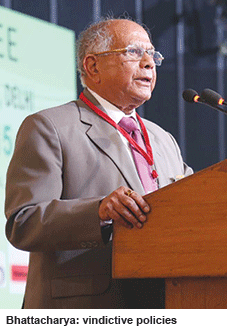
“The autonomy of private schools in India and in particular in Delhi, is under serious threat. State governments across the country are pursuing vindictive regulatory policies to force private schools into accepting absurd admission and fees policies. In Delhi, the state government has made its anti-private schools prejudice clear by changing nursery admissions criteria, abolishing the 20 percent management quota and imposing tuition fee controls. Every other day, the education ministry issues regulatory circulars to private schools and is all set to amend the Delhi School Education Act to deprive private school managements of the right of self-administration. Delhi’s private schools are among the best performing schools in the country as per your own (EducationWorld) ranking league tables. Instead of celebrating and acknowledging the contribution of our schools to Indian education, politicians and social activists are hell-bent on levelling down private schools to government school standards. It’s becoming increasingly difficult for private schools to offer quality education in a regulatory environment which is both oppressive and punitive,” says S.K. Bhattacharya, president of the Delhi-based Action Committee of Unaided Recognised Private Schools which represents 400 private schools in the national capital region.
Likewise, instead of concentrating on upgrading teaching-learning standards in government schools to enable them to compete for middle class students who overwhelmingly prefer private K-12 education, populist state governments have sought to curry favour with the politically influential middle class by interfering with the administration and particularly tuition fees, of private schools. For instance, in Tamil Nadu, ever since the erstwhile DMK government enacted the Tamil Nadu Schools (Regulation and Collection of Fee) Act, 2009, three private school fee determination committees (PSFDCs) have been constituted to regulate tuition fees of the state’s 5,934 private K-12 Matriculation schools (the Matriculation Schools Examination Board was abolished in 2010 and all Matriculation schools were brought under the purview of the common Tamil Nadu State Board of School Examinations), as also 5,000 private nursery-primaries.
Under the Act, tuition fees sanctioned by the PSFDC must remain unchanged for three years after which school managements may petition the committee for revision. Apart from determining tuition fees, PSFDC has also been invested with power to prescribe salaries payable to teachers by private schools. The latest PSFDC headed by Justice S.R. Singaravelu, has stipulated monthly salaries of Rs.6,000-10,000 for primary and high school teachers and Rs.20,000 for higher secondary teachers.
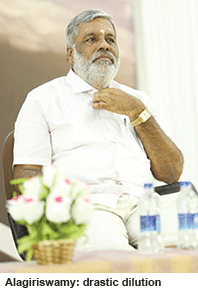 “Tuition fees ceilings are pre-determined by the PSFDC and the entire process of soliciting information about infrastructure facilities, number of students and teachers from private schools is a charade. While determining tuition fees, the committee doesn’t take additional construction and maintenance of infrastructure expenses into account. Neither does the committee respond favourably to requests for fee hikes with increases generally limited to a mere Rs.500 after three years. We are also unable to recruit well-qualified teachers at the ridiculously low salaries prescribed by PSFDC and are burdened with training inexperienced teachers. There is also a cap on charging parents for extra-curricular activities after school hours. If school managements violate the fees diktat, they are threatened with derecognition and closure by education inspectors,” says R. Visalakshi, president of the Tamil Nadu Private Schools Association, which has a membership of 1,500 schools statewide.
“Tuition fees ceilings are pre-determined by the PSFDC and the entire process of soliciting information about infrastructure facilities, number of students and teachers from private schools is a charade. While determining tuition fees, the committee doesn’t take additional construction and maintenance of infrastructure expenses into account. Neither does the committee respond favourably to requests for fee hikes with increases generally limited to a mere Rs.500 after three years. We are also unable to recruit well-qualified teachers at the ridiculously low salaries prescribed by PSFDC and are burdened with training inexperienced teachers. There is also a cap on charging parents for extra-curricular activities after school hours. If school managements violate the fees diktat, they are threatened with derecognition and closure by education inspectors,” says R. Visalakshi, president of the Tamil Nadu Private Schools Association, which has a membership of 1,500 schools statewide.
In 2015, the incumbent AIADMK government extended the writ of PSFDC to cover the state’s 580 CBSE and 52 CISCE-affiliated schools. However, a Supreme Court order of January 28 has curtailed the powers of the PSFDC in determining fee structures of CBSE and CISCE schools in Tamil Nadu (see Education News p.20). Quite clearly in this southern seaboard state (pop. 68 million) once reputed for its high literacy and excellent schools and colleges, there’s a consensus among political leaders who have emerged from the make-believe world of popular Tamil cinema, to level education standards downwards.
Five years on, teaching-learning standards in the state’s private Matriculation schools which were hitherto reputed to provide primary-secondary education on a par with CBSE and CISCE schools, have plunged. “The abolition of the Matriculation board and imposition of the common school curriculum upon Matriculation schools has resulted in drastic dilution of academic standards. It has completely eroded our autonomy in planning curricula and selecting textbooks. Consequently, our students can’t compete with CBSE and CISCE students and fare dismally in public entrance exams for entry into best engineering and medical colleges. Moreover, the low tuition fees prescribed by PSFDC have left us with no margin to recruit quality teachers, upgrade infrastructure and provide extra-curricular education,” laments M. Alagiriswamy, correspondent, Geetanjali Higher Secondary School (Matriculation), Coimbatore.
Ill-considered, ham-fisted interference by Tamil Nadu’s populist, freebies-dispensing politicians with the administration of time-tested private schools is not exceptional. Such disrespect for the autonomy of private schools is de rigueur countrywide. In Maharashtra, Karnataka, Rajasthan and Madhya Pradesh, state governments have imposed irrational tuition fee controls upon private school managements. Unfortunately, the courts have delivered confusing and conflicting judgements on the issue of regulating tuition fees leviable by privately-promoted education institutions.
In 2002, in TMA Pai Foundation vs. Union of India, the Supreme Court ruled that private unaided professional education institutions have a fundamental right to “administer” themselves, regulate their admission processes subject to their being merit-based, and levy “reasonable” tuition fees related to investment. But a subsequent verdict of the apex court in the Islamic Academy Case (2003) directed state governments to constitute fees adjudication committees headed by retired judges to prevent “commercialisation of education”. Consequently, several high courts including the Madras high court, to which private schools have appealed to on numerous occasions, have upheld the right of the state to appoint tuition fees determination committees. .gif)
Yet the biggest blow to the private school education system, which hosts an estimated 40 percent of the country’s school-going children, came in the form of the landmark Right of Children to Free & Compulsory Education (RTE) Act, 2009, which makes it mandatory for the State (i.e Central, state and local governments) to provide free and compulsory elementary education (class I-VIII) to every child in the 6-14 years age group. However, this belated legislation transfers a part of the State’s obligation to provide free and compulsory education to private schools.
Under s.12 (1) (c) of the Act, private primary schools are obliged to annually allot 25 percent of capacity in class I for children from poor households in their neighbourhood and retain them until completion of class VIII. Moreover, s.19 requires all private schools to provide adequate infrastructure including an all-weather building, one teacher per classroom, playground, library and play materials, among other facilities detailed in a Schedule to the Act. And under s.19 (2), private schools which don’t fulfil these infrastructure norms, can be forcibly shut down by the competent authority (local and/or state governments).
Unsurprisingly, government schools are exempt from the punitive s.19 (2).
Over the past six years since the RTE Act came into force on April 1, 2010, non-minority private schools — a Supreme Court judgement (2012) exempted independent minorities-run schools from the ambit of s. 12 (1) (c) — are struggling with the burden imposed upon them by the Act to provide elementary education to poor children selected by the State. Although under s.12 (1), school managements are prohibited from collecting fees from parents of poor neighbourhood children, the state government is obliged to pay private schools the equivalent of per student expense incurred by it in its own (government) schools (s.12 (2)).
With state education departments obliged to frame eligibility rules including awarding (exempt) minority status to private schools, determining reimbursement fees, defining the boundaries of ‘neighbourhood’, and certifying poor children for admission, block education officers and inspectors are having a field day lording it over private school managements.
The upshot is that enactment of s.12 (1) (c) and its substantial approval (minority schools are exempt) by the Supreme Court in Private Unaided Schools of Rajasthan vs. Union of India (2012), have transformed private schools into a soft touch for notoriously venal bureaucrats and inspectors of education ministries in the states. Moreover, the stringent infrastructure norms prescribed by s.19 of the Act have clouded the future of the country’s estimated 300,000 ‘unrecognised’ private budget schools with a staggering reported enrolment of 60 million, which have mushroomed nationwide as a refuge for children from low-income but aspirational households fleeing dysfunctional government schools.
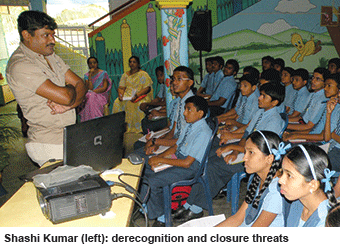 Usually promoted by small-time education entrepreneurs as for-profit enterprises, private budget schools levy modest investment-related tuition fees in the Rs.200-700 per month range. Consequently, the overwhelming majority of them can’t afford to adhere to the infrastructure norms prescribed by s.19 of the RTE Act. Therefore they are vulnerable to extortion and shake-downs by education inspectors. Edupreneurs who resist, suffer forced closure of their schools. According to the Centre for Civil Society (CCS), a top-ranked Delhi-based think-tank, over the past two years 2,983 private budget schools countrywide have been shut down with another 5,097 issued closure notices.
Usually promoted by small-time education entrepreneurs as for-profit enterprises, private budget schools levy modest investment-related tuition fees in the Rs.200-700 per month range. Consequently, the overwhelming majority of them can’t afford to adhere to the infrastructure norms prescribed by s.19 of the RTE Act. Therefore they are vulnerable to extortion and shake-downs by education inspectors. Edupreneurs who resist, suffer forced closure of their schools. According to the Centre for Civil Society (CCS), a top-ranked Delhi-based think-tank, over the past two years 2,983 private budget schools countrywide have been shut down with another 5,097 issued closure notices.
"Education department officials have converted the RTE Act, which has been legislated for public benefit, to their own private benefit. S. 19 has become the newest weapon in the hands of education inspectors and BEOs (block education officers) to squeeze and harass private schools. Starting from granting recognition certificates to sanctioning government reimbursements under s.12 (2), private schools have to make speed money pay-offs. Almost every week, education officials conduct inspections during which private school managements are threatened with derecognition and closure. The worst-hit are budget private schools which cannot afford to meet the infrastructure norms prescribed by the RTE Act. If the same infrastructure norms are applied to government schools, more than 50 percent of them will have to be shut down. Instead of harassing private school managements, state governments should focus on improving their own schools. Moreover, there’s a good case for initiating public enquiry into the assets of BEOs to curb corruption,” says Shashi Kumar, general secretary of Associated Managements of Primary & Secondary Schools in Karnataka (KAMS), which has a membership of over 1,700 schools across the state. An indefatigable champion of Karnataka’s private budget schools, Kumar is also the promoter-director of the state board-affiliated K-12 Blossoms School (estb.1993), which has an enrolment of 2,000 students (tuition fees: Rs.15,000-16,000 per year).
Quite obviously, rampant inspector raj corruption which debilitated Indian industry in the pre-liberalisation era has migrated into India’s education system. Private school managements countrywide are being routinely squeezed by education officials with threats of derecognition on flimsy grounds..gif)
Comments S.C. Kedia, president of the Mumbai-based Unaided Schools Forum, which has 250 member schools across Maharashtra: “Never in the past 20 years, have schools witnessed as much harassment from government officials as in the past one year. The new BJP state government has approved inspector raj by requiring schools to renew their NOCs (no objection certificates) every three years to ensure adherence to (RTE Act) s.19 norms. Moreover, the state government has also legislated a Maharashtra Educational Institutions (Collection of Fees Regulation) Act. As a result, corruption has increased multi-fold. Schools have to routinely pay to claim reimbursements for admitting s.12 (1) (c) quota students while a recognition certificate for new schools could cost Rs.10 lakh.”
In fact, government harassment of private school promoters begins when greenfield schools are on the drawing board. Edupreneurs have to fulfil a bewildering number of conditions to get the green light from state education ministries. Private school promoters, whether a collection of like-minded people or a corporate entity, must register under s. 8 of the Companies Act, 2013 as a not-for-profit company or under the Societies Act, 1860, or as a charitable trust. Thereafter, they have to get land acquisition clearance, construction approvals, provide evidence of adequate infrastructure and teaching facilities — library, playgrounds, number of teachers and students etc. While promoters of proposed state board-affiliated schools need to obtain all approvals from state education ministries, the Delhi-based CBSE/CISCE examination boards prescribe their own infrastructure, teacher-pupil ratios and other norms prior to grant of affiliation. But even so, all affiliation applicant schools have to produce an NOC from their state governments.
.gif) Until recently, promoters of new state board-affiliated schools in most states including Karnataka, Tamil Nadu and West Bengal had to undertake to teach children in classes I-V exclusively in the vernacular language with proposed English-medium schools routinely denied approval. Shockingly, despite a 1994 ordinance to this effect, in Karnataka an estimated 15,000-plus English-medium primary schools mushroomed in the period 1994-2014 with education and government officials routinely turning a blind eye to infractions of the ordinance for pay-offs. Only after the Supreme Court in a judgement dated May 6, 2014 (State of Karnataka & Anr. vs. KAMS) ruled that the state government cannot stipulate medium of instruction as a condition for recognition of private schools, and that the right to freedom of expression under Article 19 (1) (a) of the Constitution includes the right of parents to choose the medium of instruction of their children, have state education departments begun to sanction new English-medium schools.
Until recently, promoters of new state board-affiliated schools in most states including Karnataka, Tamil Nadu and West Bengal had to undertake to teach children in classes I-V exclusively in the vernacular language with proposed English-medium schools routinely denied approval. Shockingly, despite a 1994 ordinance to this effect, in Karnataka an estimated 15,000-plus English-medium primary schools mushroomed in the period 1994-2014 with education and government officials routinely turning a blind eye to infractions of the ordinance for pay-offs. Only after the Supreme Court in a judgement dated May 6, 2014 (State of Karnataka & Anr. vs. KAMS) ruled that the state government cannot stipulate medium of instruction as a condition for recognition of private schools, and that the right to freedom of expression under Article 19 (1) (a) of the Constitution includes the right of parents to choose the medium of instruction of their children, have state education departments begun to sanction new English-medium schools.
“An estimated 14-32 permissions are required for starting private schools in states across the country. This makes it very difficult for honest entrepreneurs to promote for-profit or not-for-profit schools. The plethora of licences to be obtained is the main reason why politicians and real estate barons who know how to game the system, dominate the private education space. The RTE Act, 2009 has further worsened the regulatory regime by stipulating rigid infrastructure norms for recognition of schools. As we complete 25 years of economic liberalisation in India and celebrate the choices it has allowed us in goods and services, it’s imperative for education to be liberalised as well,” says Dr. Parth Shah, founder-president of the Delhi-based Centre for Civil Society.
According to Shah, delicensing and allowing for-profit companies in the education sector would attract capital and talent into education. “Communist China allows for-profit schools and colleges, why shouldn’t India? Even though food and water are far more critical for human survival than education, farmers and retailers are permitted to earn profit. Even pharmacies and hospitals are run for-profit. Therefore why the bias against commercialisation of education? Allowing for-profit enterprises in this sector would attract genuine educationists and capital which will contribute to raising primary-secondary education standards. This will also reduce the power of existing schools to extort high fees from parents. Increased competition will improve quality and lower rents, as has happened in many other sectors of the Indian economy,” says Shah.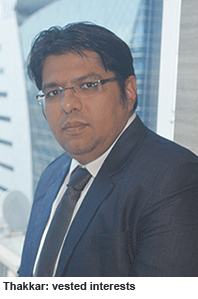
The irrational bias against “commercialisation of education” in Indian society, repeatedly endorsed by the Supreme Court and only recently relaxed by the apex court in the TMA Foundation (2002) and P.A. Inamdar’s (2005) cases — but which are applicable to higher education institutions — has prompted school promoters to create two legal structures: a trust/society that runs the school on a not-for-profit basis, and a company which owns all the school assets — land, buildings, equipment — which it rents to the trust for contracted fees. Moreover, a range of services — management consultancy, teacher recruitment, equipment procurement etc — are provided for fees. Almost every school promoter is using this twin structure to beat the system and earn profits.
"Nobody can deny that school education is over-regulated and that the absurd number of licences, permits and clearances required are discouraging genuine edupreneurs from promoting quality schools. Rents-seeking bureaucrats and officials have a vested interest in discretionary rules and regulations, and politicians are keen on regulating tuition fees to keep their vote banks intact. But this is choking the supply side of quality schools. A promoter who has made substantial investment in starting a school, has the right to decide admission criteria and tuition fees. Government regulation should be limited to ensuring quality and learning outcomes and preventing monopolistic pricing. All private schools should be allowed to run for-profit and their taxes utilised for improving run-down government schools. In a free market, under-performing private schools will shut down for want of students,” says Atul Thakkar, vice president, investment banking and head of education practice at the Mumbai-based Anand Rathi Financial Services.
But it’s not just interventionist politicians and bureaucrats who are slowly but surely crushing India’s high-performance independent schools. Paradoxically, although post-independence India’s acquisitive 300-million strong middle class shuns government schools like the plague and moves heaven and earth to ensure the admission of their progeny into top-ranked private schools, this amoral subsidies-addicted class is unwilling to pay the price of the high-quality “world-class” school education it invariably demands for its children. Most parents are quick to invite government intervention to ‘regulate’ tuition fees of private schools, foolishly unaware that this is certain to let in the Trojan horse of corruption and diluted academic standards through school gates.
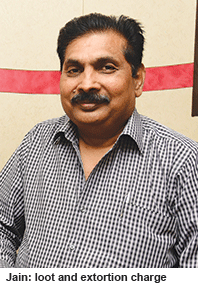 “Parents can’t be blamed for demanding regulation of tuition fees as most schools raise fees arbitrarily and indulge in profiteering. The Mumbai-based Ecole Mondiale World School charges a tuition fee of Rs.8 lakh per year for nursery children. This is nothing but loot and extortion in the name of providing quality education. Such rampant over-charging has to stop as it is making education out of the reach of middle class households. Private schools need to be more tightly regulated by government as the current regulations are already pro-private,” says Jayant Jain, president of the Forum for Fairness in Education, a Mumbai-based NGO which “fights against commercialisation of and corruption in education”.
“Parents can’t be blamed for demanding regulation of tuition fees as most schools raise fees arbitrarily and indulge in profiteering. The Mumbai-based Ecole Mondiale World School charges a tuition fee of Rs.8 lakh per year for nursery children. This is nothing but loot and extortion in the name of providing quality education. Such rampant over-charging has to stop as it is making education out of the reach of middle class households. Private schools need to be more tightly regulated by government as the current regulations are already pro-private,” says Jayant Jain, president of the Forum for Fairness in Education, a Mumbai-based NGO which “fights against commercialisation of and corruption in education”.
Evidently long-accustomed to unmerited subsidies grabbed by the middle class in post-independence India, Jain is unfamiliar with free market economics. Parents who choose to enroll their children in Ecole Mondiale don’t need the protection of the Forum for Fairness in Education. Moreover, less affluent middle class households have the option of enroling their children in the country’s other private schools — which offer primary-secondary education at all price points. Indeed, it’s arguable that India’s 319,000 recognised private schools offer the cheapest privately provided education worldwide.
“The Central and state governments need to understand and acknowledge the contribution of private schools to the nation’s economy. They are the backbone of our education system as all top performers in business, industry and the professions have graduated from them. Instead of over-regulating and harassing private schools, they need to focus on improving and upgrading their own schools so that parents dissatisfied with private schools could enroll their children in free-of-charge government schools,” says Shashi Kumar, general secretary of KAMS (quoted earlier).
The plain unvarnished truth is that although they constitute a mere one-fifth of the country’s 1.40 million primary-secondaries, private schools educate 40 percent of India’s children as they are overwhelmingly preferred by all segments of society, as testified by the mad rush for admission into them at the start of every academic year. Moreover, with primary and secondary school enrolments rising continuously, there’s a severe overall shortage of schools. According to an Ernst & Young report titled Private Sector’s Contribution to K-12 Education in India (2014), an additional 130,000 private schools are required by 2022 to meet growing demand..gif)
Rohit Mohindra, director of Raj Mohindra Consultants Pvt. Ltd, a pioneer Mumbai-based education consultancy, believes that liberalisation of the education sector is essential for raising academic standards in K-12 education. “Education is one of the few sectors where the licence-permit-quota regime still persists after liberalisation of the economy in 1991. There are many reasons for this — a nanny state mindset, the fact that many politicians run educational institutions and therefore have a vested interest in the status quo, and easy rent-seeking opportunities for education officials. It’s time for the Centre to extend liberalisation to the education sector. All licences and permits required to promote private schools should be simplified, put online, and time bound. A school promoter should also be free to fix the fees structure, teachers’ pay scales, admission criteria, etc and let the market determine its success. We are a great entrepreneurial nation, so schools will come up at all price points. The Central and state governments should be facilitators, rather than micromanagers, because — let’s face it — they neither have the resources nor capability to improve private schools,” says Mohindra.
Clearly, it’s in the national interest that private schools, which have played a major role in educating the country’s 300 million-strong middle class which has led post-independence India’s national development effort, are unshackled from the tightening stranglehold of the licence-permit-quota regimen which has struck deep roots in the education sector. The world’s largest child population requires thousands of greenfield — including budget — private schools which are overwhelmingly preferred by all segments of the population. The proper role of the State is not to police and regulate private schools but to focus its attention on driving up academic standards and learning outcomes in the country’s under-performing 1.2 million government schools.
The public interest demands liberalisation and deregulation of Indian education for realising the nation’s demographic dividend and developing its abundant and long-neglected human capital.
With Autar Nehru (Delhi), Dipta Joshi (Mumbai) & Hemalatha Raghupathi (Chennai)